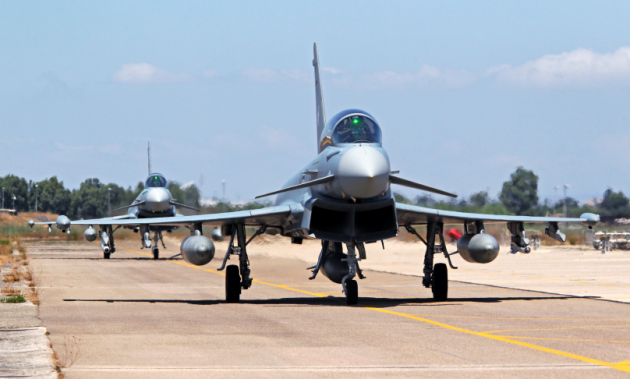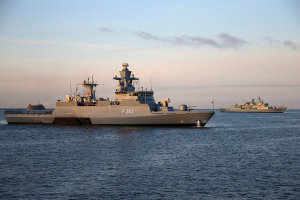During a joint event organised by the British Embassy and the Federal Academy for Security Policy, high-ranking British and German representatives from government, military, business and science examined possible consequences and prospects of Brexit for security and defence.

After Brexit: What will be the future of the Eurofighter? Called Typhoon in the United Kingdom, this aircraft is one of many examples of European defence cooperation with UK participation. Picture: Bundeswehr/Vennemann
With the United Kingdom, a key player in terms of security policy will be leaving the European Union, whose military capabilities have so far provided up to 50% of the EU’s capacities. Hence, Brexit raises urgent questions regarding future security and defence cooperation in Europe: What positions will Berlin and London take? Under what conditions is continued security policy cooperation possible and what effects will Brexit have on the defence industry? On 29 January 2019 high-level experts from science, politics, the military and the armaments industry met at the British Embassy for a joint event with the Federal Academy for Security Policy to find answers to these questions.
In introductory briefings, renowned scientists and generals from the UK and Germany gave a clear and authentic overview of the perspectives regarding Brexit held in the countries concerned. During lively expert debates in which high-level politicians participated, these perspectives were discussed in more detail in accordance with the Chatham House Rule – while what is said can be passed on, the identity and affiliation of the participants in the discussion must remain confidential. In a still ongoing process of political implementation, the following current situation picture finally revealed itself to the participants: The UK and the EU share an interest in continuing to work closely together in the area of security and defence even after Brexit. However, the discussions in Berlin also brought to light a number of specific topics that need to be clarified. It is, for example, completely uncertain at the moment what sort of access the UK will have to EU defence structures. This concerns in particular the Permanent Structured Cooperation (PESCO) and the European Defence Fund (EDF). It must be clarified on what terms London can participate in joint projects.
Bilateral politicisation of EU defence policy?

The debate brought together several British and German experts. Picture: British Embassy Berlin
The discussions held at the British Embassy illustrate that an agreement may possibly be harder to achieve. Post-Brexit relations will not be able to replace London’s previous involvement in the EU’s security and defence policy if the EU intends to stick to its autonomous decision-making process regarding Common Security and Defence Policy (CSDP), for example. From the British point of view, relations with the EU such as those maintained by Norway will not work.
In this context, the UK is frequently accused of “cherry picking” in that it prioritises certain cooperation projects that may contribute to achieving its own interests. British participants in the discussion rejected this suggestion – arrangements would have to be made between the EU and the UK that would go beyond those made with third states. However, this point of view was difficult to bring across in Brussels, they claimed. The fact remains that British security and defence capabilities are virtually unique and the EU can hardly do without them.
NATO: The winner takes it all?

An example of British-German defence cooperation: During the German Operational Sea Training, the Royal Navy trains German sailors on the Corvette Erfurt off Plymouth, shown in the foreground. Picture: Bundeswehr/Wilke
Given the as yet politically unclear access to the EU, the UK would nevertheless remain a committed partner and continue to uphold European security – for example by contributing personnel to rotating NATO forces in the Baltic region, it was said. Another result of the discussion was that the UK would continue to be open to contributions to EU operations. NATO could become the main forum to coordinate with allies when the UK would no longer be able to help shape responses to security policy challenges at the EU level, it was said. NATO might even benefit from more British commitment after Brexit.
The discussions further made clear that particularly questions of economic policy posed by the armaments industry as part of Brexit should be quickly clarified in the common interest in order to prevent possible harm to future defence capacities. National defence industries are, for example, increasingly less capable of implementing military procurement projects on their own. Brexit could ultimately negatively affect global competitiveness in various sectors. Therefore, the conclusion of institutional agreements between the UK and EU member states is given highest priority in order to achieve a stable partnership for the future.
The bottom line
At the end of the event the following had become clear: Brexit confronts the UK and their continental European partners with challenges not only in terms of economic policy but also in terms of security policy. The strategic dimension illustrated one thing in particular: London and its continental European partners must come up with pragmatic solutions for common defence efforts in order to slow down Europe’s loss of importance in the area of security policy. In view of current threats, it will ultimately be essential to identify common interests in order to shape post-Brexit relations between the UK and continental Europe in a future-oriented manner.
Author: Sarah Kirsch
